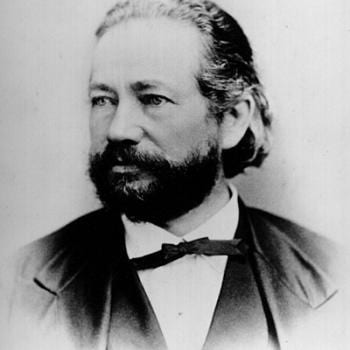
Evangelicals love to talk about “common grace.” Some recent examples from some Big Eva big wigs:
How does pro-life legislation violate separation of church and state? The state passed the legislation, not the church. There are solid common grace grounds for protecting unborn life. Glad for you to define question further. https://t.co/WlBdlMXLY8
— Albert Mohler (@albertmohler) February 20, 2021
To judge a theory remember both the anti-thetical nature of worldviews and common grace. Christians very friendly to CT often forget the former and those most critical often forget the latter. Besides the two books below read the new Bavinck scholarship.
— Timothy Keller (1950-2023) (@timkellernyc) February 19, 2021
I covered some of what Keller was referring to above (and in a couple other tweets) at my Substack a few weeks ago, and will not reiterate here. The purpose of the reference is to show “common grace” in action out in the wild. (Disclaimer: I am actually a pretty big fan of Al Mohler’s and, generally, harbor no antipathy toward Keller, though, as here, I usually find him intentionally opaque–its part of his sage wisdom persona.)
My beef here–an ongoing beef that extends beyond Mohler and Keller–is that “common grace” is basically content-less. That is to say, a near meaningless theological category that, if it ever did do any real work at all, is a catch-all, but round-about repudiation of, natural law. But transformationalist, neo-Calvinist, evangelicals, in particular, love it! And, of course, Abraham Kuyper, the darling of that faction, is usually cited in the same breadth. Granted I have not done sufficient in-depth study of Kuyper to comment directly on his use of the term; I am generally disinterested in 19th and 20th century Dutch theologians (though I’ve read Bavinck and, begrudgingly, some Van Til). If we stretch back further than Kuyper’s century then this neo-Calvinist account of natural man’s grasp of morality and law–proponents usually shove providential provision for all creatures into this category too–runs into some theological-conceptual problems, in my opinion. In short, it confuses grace and mercy.
To this end, Francis Turretin’s Institutes:
How mercy is to be ascribed to God.
X. Mercy attends upon the grace of God. For as the latter exercises itself about man as a sinner (granting the pardon of his sin) so the former is exercised about man as miserable (relieving his misery). This is properly ascribed to God not as signifying grief arising from the misery of another (as it is in men), but as indicating a prompt and disposed will to succor the miserable without any anguish or perturbation of mind.
It does not spring from any external cause which usually excites this effect in men (as the tie of blood, of friendship, the company of misery, imbecility of age, sex, etc.). Rather it springs from his goodness alone (as he loves to communicate himself to the creature and as he does not refrain from succoring the miserable). Indeed, it requires misery in the object, but only as holding the relation of condition and quality and not of a cause. So freely is it occupied about it, that it can exert or not exert itself without injury to anyone. Hence it is said “he hath mercy on whom he will have mercy” (Rom. 9:18).
General and special.
XII. Mercy is commonly considered as twofold: the one general by which God succors all creatures subjected to any misery (Ps. 104:27); the other special by which he has compassion on his own, electing out of the mass of fallen men certain ones to be saved through Christ (who are, therefore, called “vessels of mercy”). The former is temporal, occupied only with secular things (ta biotika) and the good of this life; but the latter is saving and eternal, blessing us with the possession of salvation and of eternal life.
XIII. The magnitude of his mercy may be collected from various sources: (1) with regard to the principle of pitying, (viz., God who, perfectly happy in himself and in want of nothing, yet moved by his good pleasure [eudokia] alone, condescended to have mercy upon us); (2) with regard to the objects (i.e., men upon whom he takes pity who not only deserved nothing, but are totally unworthy of this favor as sinners and enemies of God); (3) with regard to the mode and effects because he pardons our innumerable sins, removes eternal misery from us and bestows an infinite and eternal good (to wit, life and salvation); (4) with regard to duration because it is eternal (chmd ‘vlm, Is. 54:8; Hos. 2:19; Lam. 3:22; Lk. 155″). Hence it is to be opposed: (a) to the severity of the divine justice, in which sense it is said “to rejoice against judgment” (Jam. 2:13); (b) to the number and heinousness of sins (Mic. 7:18); “For where sin abounded, grace did much more abound” (Rom. 5:20), and “God hath concluded all in sin, that he might have mercy upon all” (Rom. 11:32); (c) to the multitude of miseries and temptations because there is not one so great from which the supreme mercy of God, according to his inexpressible riches, does not free us (Ps. 103:8; Eph. 2:4, 5); (d) to the terror of death and the divine judgment because in that decisive day all the pious will obtain mercy (2 Tim. 1:18).
XIV. Although the mercy of God is most ample and manifold with regard to the effects which are innumerable (in which sense he is called “abundantly merciful” [polyekos, Ps. 51:l; 1 Pet. 1:3], oiktirmoi [i.e., commiseration and bowels of compassion are ascribed to God, Rom. 12:1]), yet it has its own objects and vessels into which it is poured out (viz., the elect and believers upon whom he determined to have mercy from eternity, who are distinguished from others whom he decreed to pass by and are therefore called “vessels of wrath fitted to destruction,” Rom. 9:22). It is an asylum for the penitent and pious, but not a refuge for the impenitent and impious.
The Westminster Assembly seemed to grasp this distinction as well. In Alexander Mitchell and John Struthers’ Minutes of the Sessions of the Westminster Assembly of Divines (1874), the authors tell of a committee, “apparently of English members only,” which discussed myriad questions, one of which was the following:
Q. Do all men equally partake of the benefits of Christ?
A. Although from Christ some common favors redound to all mankind, and some special privileges to the visible Church, yet none partake of the principal benefits of His mediation but only such as are members of the Church invisible.
Q. What common favors redound from Christ to all mankind?
A. Besides much forbearance and many supplies for this life, which all mankind receive from Christ as Lord of all, they by him are made capable of having salvation tendered to them by the gospel and are under such dispensations of Providence and operations of the Spirit as lead to repentance.’
“Common favors” refer to God’s indiscriminate providence, which Turretin refers to as “God’s common providence.” Common favor is decidedly not the same as “common grace,” but it is akin to common mercy within divine providence. The latter does not imply a special, effectual, salvific grace reserved only for God’s elect in Christ.
Likewise, in Thomas Manton’s (1620-1677) dedicatory letter to the Westminster Confession, he distinguished between “common love, and a special love.” But the former simply described God’s care and affection for all that he had made within his providence, holding all things together (Col. 1:17). The latter alone was a “special love which brings grace and salvation along with it.”
Grace and mercy are qualitatively, substantively distinct.
“Common grace,” though an ill-conceived category, in my opinion, may have had some functional legitimacy and coherence up through the 18th century. (Edwards was sloppy and somewhat disinterested in his articulation of this idea but made it work by marrying it to the common operation of the Holy Spirit within indiscriminate providence; and part of that common operation was the relentless publication of the natural law, which was then grasped by man’s reason, recognized as the law inborn in them. Calvin too had considered a non-salvific work of the Spirit on people. Rutherford seems to have employed “common grace” in the prepatory sense, meaning that it inevitably led to salvation of the elect.)
Even if, for the sake of argument, the point above was ceded, it has since then become increasingly unintelligible; its only purpose seems to be that of a loophole by which contemporary evangelicals, uncomfortable with the natural law tradition, can nevertheless make some sense of residual goodness, reasonableness, etc. in reprobate man. The problem with this—and there are many, which I hope to treat more fully in the future—is that “common grace” is an unaccountable category by which anything seemingly true can be accepted, whereas a robust conception of the natural law provides means and standards of analysis of a given truth claim–not the least of which being a robust tradition encompassing it by which assertions can be measured, categorized, and etc.
One of my questions—yet to be answered—is that, if common grace accounts for how men do good, on what basis do they, in fact, do good? Is there ethical content to common grace? Unlike the natural law, the answer to this question seems to be in the negative. But Mohler seems to think so (i.e., “common grace grounds”) but, in truth, there doesn’t seem to be. Rather, its an explanation for the continuing, post-fall function of the natural moral law (i.e., Romans 2) that nevertheless refuses to acknowledge the natural law as such.
Common grace, as it presently functions, not only muddles the theological content of grace but also cuts out the need for the old category of “right reason,” and the like, so intricate to the natural law tradition. Looking to Turretin, it seems to be a confusion of categories, i.e., mercy v. grace. Another relevant query for those that regularly invoke common grace in the way described above would be the function of mercy. Is it common too? If so, how is it distinguished from common grace? In short, it is my (unpopular) contention that common grace is a not so elaborate theological, ethical cop-out. (If there are likeminded people out there, please make yourself known!)
Perhaps, I am way off base, but the confusion of mercy and grace–though not as fatal as the confusion of law and gospel–seems to me an error forced by employing common grace thought as substitute for natural law thought, not to mention its recent, undeveloped heritage. Innovation should still be suspect to us. Historically, this common grace certainly is.
Image credit: @r_shayesrehpour/Unsplash












